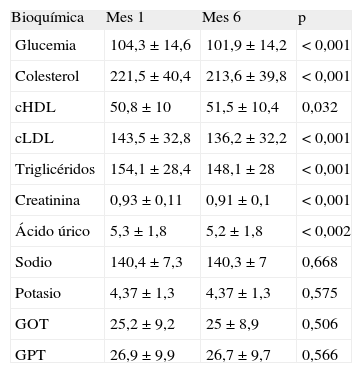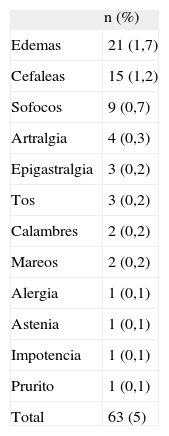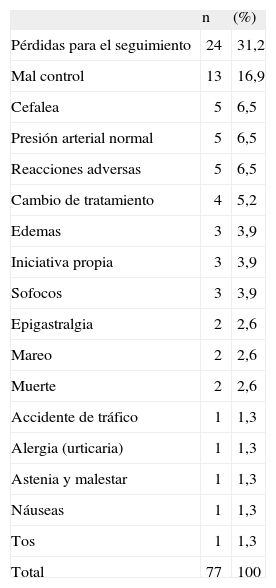Valorar la eficacia del lercanidipino en el control de la hipertensión arterial, así como su tolerabilidad clínica y bioquímica.
Material y métodoEstudio observacional, multicéntrico, abierto, de seguimiento a medio plazo realizado en centros de atención primaria. Participaron 206 médicos de atención primaria que incluyeron a 1.455 hipertensos de 20 a 75 años. A todos se les indica tratamiento con lercanidipino 10mg/día en monoterapia. Si no se alcanza el control, se añade enalapril 20mg/día. Se hicieron controles clínicos con medición de la presión arterial en la consulta al inicio y tras 1, 3 y 6 meses de iniciado el tratamiento con lercanidipino. Se valoran los posibles efectos adversos o abandono del tratamiento. Al inicio y al final del estudio se realizó analítica y se midieron las variables antropométricas.
ResultadosInicialmente, se excluye a 189 (12,9%) pacientes por violaciones al protocolo. Inician tratamiento 1.266 pacientes. De ellos, 876 (69,2%) acaban con lercanidipino 10mg/día en monoterapia, de los que el 72,3% alcanza normotensión. De los 364 a los que se añadió enalapril, el 61,3% alcanzó normotensión. El control general de los pacientes tratados en el estudio alcanzó el 68,4% de los casos. La evolución del perfil bioquímico mostró una disminución significativa de la glucemia basal, que pasó de 104,3 a 101,94mg/dl (p<0,001); el colesterol total, que evolucionó de 221,5 a 213,6mg/dl (p<0,001), y el colesterol de las lipoproteínas de baja densidad, que pasó de 143,5 a 136,2mg/dl (p<0,001). Apareció un total de 63 reacciones adversas (el 4,3% de los pacientes). Sólo se registraron 5 abandonos por efectos secundarios.
ConclusionesEl lercanidipino es un tratamiento antihipertensivo efectivo en monoterapia que se ve potenciado por la combinación con enalapril. Este efecto se acompaña de una excelente tolerabilidad.
The study has aimed to evaluate the effectiveness of lercanidipine in the control of the hypertension as well as its clinical tolerability and biochemistry.
Material and methodThis is an observational, multicenter, open label study with a mean follow-up period in primary care sites. A total of 206 primary care physicians participated, and 1455 hypertensive patients from 20 to 75 years were included. All were treated with lercanidipine 10mg/day in monotherapy. If their blood pressure was not controlled, enalapril 20mg/day was added. Clinical controls were made with measurement of the blood pressure in the consultation at the onset, and then at 1, 3, and 6 months of initiating treatment with lercanidipine. The possible adverse effects or dropouts from treatment were evaluated. Laboratory analyses were performed at the beginning and end of the study and the anthropometric were measured.
ResultsA total of 189 patients were initially excluded due to protocol violations (12.9%), so that 1266 patients began treatment. Of these, 876 were finally treated with lercanidipine 10mg/day as single drug therapy (69.2%), 72.3% of them achieving normal blood pressure. In 364 patients, enalapril was added, 61.3% achieving normal blood pressure. The global control of the patients treated in the study was 68.4%. The evolution of the biochemical profile showed a significant decrease of the baseline glycemia that went from 104.3mg/dl to 101.94mg/dl (p<0.001), of the total cholesterol that evolved from 221.5mg/dl to 213.6mg/dl (p<0.001) and of the LDL cholesterol that evolved from 143.5mg/dl to 136.2mg/dl (p<0.001). There were 63 adverse reactions (4.3% of the patients). There were only 5 dropouts due to side effects.
ConclusionsLercanidipine is a effective antihypertensive treatment in monotherapy which is enhanced by association with enalapril. This effect is accompanied by an excellent tolerability.
Artículo
Comprando el artículo el PDF del mismo podrá ser descargado
Precio 19,34 €
Comprar ahora












